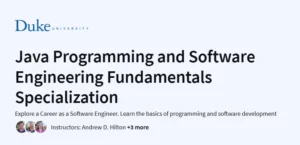What you will learn in the Python Programming Fundamentals
Write basic Python programs using variables, data types, and operators.
Implement conditional statements and loops to control program flow.
Utilize functions and modules to write reusable and organized code.
Manipulate data using lists, dictionaries, and other data structures.
Debug code and handle errors effectively.
Employ Git for version control and create a professional GitHub portfolio.
Program Overview
Module 1: Introduction to Python
⏳ 4 hours
- Provides a comprehensive introduction to Python programming, including fundamental concepts, installation of Python and Jupyter Notebook, and writing your first Python program.
Module 2: Variables and Data Types
⏳ 4 hours
- Covers the use of variables and data types in Python, enabling you to store and manipulate data effectively.
Module 3: Control Flow
⏳ 4 hours
- Introduces conditional statements and loops, allowing you to control the flow of your programs based on different conditions.
Module 4: Functions and Modules
⏳ 4 hours
- Focuses on creating reusable code through functions and organizing code using modules.
Module 5: Data Structures
⏳ 4 hours
- Explores Python’s built-in data structures like lists and dictionaries, essential for managing collections of data.
Module 6: Debugging and Version Control
⏳ 4 hours
- Teaches debugging techniques and introduces version control using Git and GitHub to manage and collaborate on code projects.
Get certificate
Job Outlook
Completing this course prepares you for entry-level roles such as Python Developer, Data Analyst, or Software Engineer.
The skills acquired are applicable across various industries that utilize Python for software development and data analysis.
Enhance your employability by gaining practical experience in Python programming and version control.
Specification: Python Programming Fundamentals
|
FAQs
- You’ll need Python installed (latest stable version recommended).
- A code editor like VS Code or PyCharm is optional but useful.
- Jupyter Notebook is highly recommended for practicing code snippets interactively.
- Around 5–7 hours per week is ideal for beginners.
- Consistency matters more than long single sittings.
- Regular practice of small coding exercises helps retain concepts better.
- It will strengthen your problem-solving and coding basics.
- You’ll be comfortable with common coding tasks like loops, conditionals, and data handling.
- For interviews, you’ll still need to learn algorithms, data structures, and practice coding challenges.
- Yes, this course builds a solid foundation needed in data science.
- Next steps would include learning libraries like NumPy, pandas, and Matplotlib.
- You’ll also need statistics, machine learning basics, and hands-on projects.
- Start by carefully reading error messages; they often point to the problem.
- Use online communities like Stack Overflow or Python forums for guidance.
- Revisiting course exercises and practicing debugging strategies is essential for improvement.





